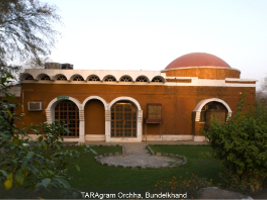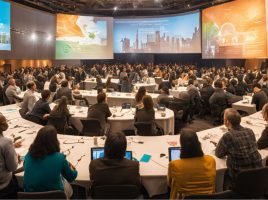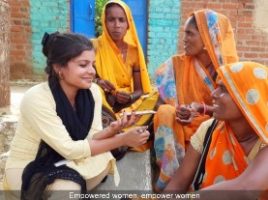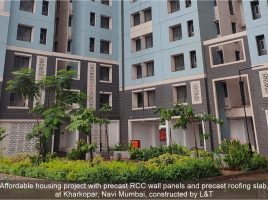Airwaves of Change: Radio Bundelkhand’s Gender-Inclusive Revolution

With its rugged landscape and arid climate, Bundelkhand is a canvas painted by contrasts. This plateau, marked by breathtaking landscapes, has also been scarred by a pattern of harsh climate—frequent droughts, shrinking water tables, and cracked, thirsty fields. For generations, it has been shaped by erratic monsoons and depleting natural resources and exemplifies the challenges of rural India in the face of climate change. When Development Alternatives (DA) chose this region as its karmbhoomi, it was not just a site of intervention. It became the ground where we innovated, learnt, and proved that communities can lead towards sustainable, equitable change even in the most demanding environments.
What sets Radio Bundelkhand apart is its participatory approach. For 16 years, Radio Bundelkhand has emerged as a means for gender-inclusive communication, particularly in addressing the disproportionate impact of climate change on women. It has not only changed the scenario through its powerful messaging but also turned up the numbers. Women are not just listeners of this radio station but active contributors. The same women who once hesitated to speak outside their homes now confidently discuss issues like organic farming and rainwater harvesting on air through programmes such as Shubh Kal (A Better Tomorrow) and Khet Khalihan. These women call in to discuss challenges, share solutions, and connect with experts—fostering a culture of collective problem-solving.
Geeta is one such example among many. Stories of women adopting sustainable farming practices and reverse migration are among the many achievements of Radio Bundelkhand. Our recent video podcast, which was conducted in partnership with L’oreal Foundation on Climate Change and its impact on women, is another classic example of how we aim to put women at the forefront of our climate communication strategy. What started as individual action has become a silent revolution, fostering a culture of peer learning and collective problem-solving.

But Radio Bundelkhand’s work is not limited to raising awareness. In partnership with local organisations, the station has trained community journalists to report on climate issues, ensuring that the stories broadcast are authentic, relatable, and deeply rooted in local realities. It collaborates with local and national experts to design content that bridges the gap between policy discussions and grassroots realities.
In our karmabhoomi, Radio Bundelkhand is not merely a station. Instead, it is a lifeline for knowledge, and through it, we see how communication, when done inclusively and thoughtfully, can transform challenges into opportunities for collective action. This initiative is a prism through which people—particularly women—show that resilience is not just a response but a way of life.
The views expressed in the article are those of the authors and not necessarily those of Development Alternatives.
This blog first appeared as an editorial in Development Alternatives Newsletter February, 2025 https://devalt.org/newsletter/60-radio-bundelkhand-and-its-gender-inclusive-approach-towards-climate-communication






Leave a Reply